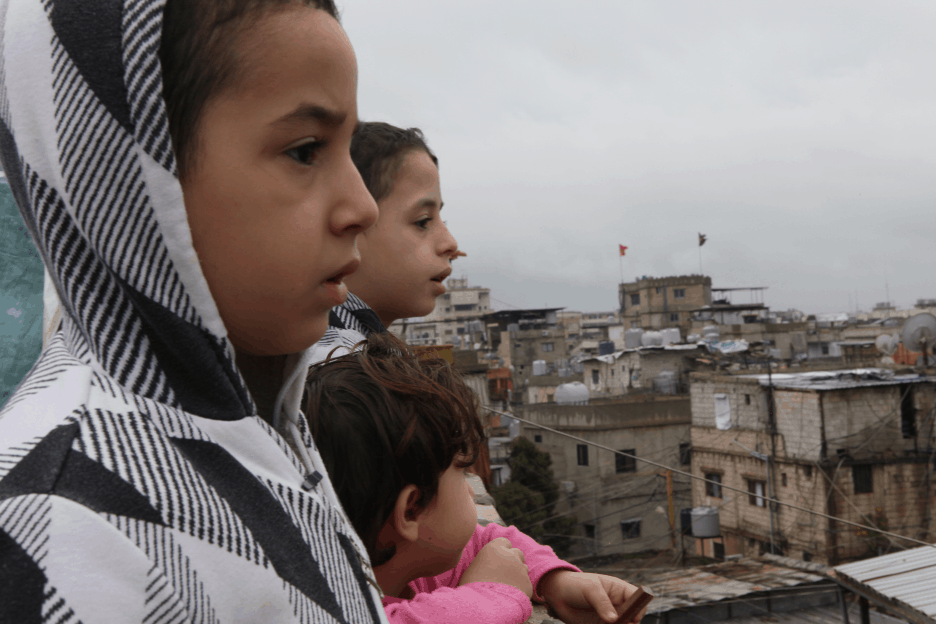MICHAEL BALL, Web Editor—The inaugural Middle East Film Festival presented its first film, Obscure, in Herrick Auditorium on Thursday, Feb. 25. Obscure (2017) tells the story of Ahmad, a Syrian child living in a refugee camp in Lebanon who doesn’t want to remember that he is Syrian.
Obscure is an emotional film that uses silence and colors to paint the story of Syrian identity collapse. Kaadan noted in the discussion that the film works with the uncomfortable topics of identity collapse, blindness in trauma and healing. The dark, quiet cinematic shots of Ahmad, 7 years old, struggling to wake up from sleep quickly transition to bright, loud cell phone videos of the destruction in his hometown of Dara’a, Syria.
Ahmad is later asked questions like “Where are you from?” and “Do you remember?” He responds with silence, but slowly grows more comfortable with the questions. The film subsequently shifts to colorful, joyful shots of Ahmad playing a musical instrument with a mental health counselor. The instrument becomes Ahmad’s source of joy. At the end of the film, when asked where Ahmad is from, his brother responds with “Dara’a, Syria,” and Ahmad affirms the answer with a smile.
Students and faculty joined film director Soudade Kaadan in a discussion before the screening. When asked for her thoughts on how Syria and the broader Middle East are portrayed in film, Kaadan reflected on a request fellow filmmakers made during production: “They told me to ‘Make [the film Obscure] more Syrian.’ What does ‘more Syrian’ mean?” Kaadan noted that common discourse on Syria in film is filled with war and violence, and often loses the human aspect. She aimed to produce a film exploring the humanity of the war, especially in the realm of children and trauma.
Obscure was produced across six years in Lebanon and Syria. In a Sept. 2020 interview for Jadaliyya with Dr. Isis Nusair, Associate Professor of Women and Gender Studies and International Studies at Denison University, director Kaadan said that she “decided to change the focus of the film [from war] to talk about the trauma and silence that result from war.”
In the film, Ahmad lives in the Shatila Refugee Camp in Beirut, a place where refugees struggle to find work and education and have no basic rights. Though, when asked what he loves, Ahmad responds with “Shatila.” Kaadan says that “The memory of place, absent from his mind, yet present in ours, makes the answer to this question [of what Ahmad loves] crueler. For him, Shatila is a beautiful place. He refuses to remember Dara’a and the war.”
Kaadan closed her Jadaliyya interview by saying that producing Obscure “was therapeutic” for herself and Ahmad. The layered questions of identity, silence, belonging, trauma and healing “are part of the artistic process… and how to express in words what was going on.” Kaadan noted that “Slowly, [Ahmad] gradually changes.”
The next films to be screened on Thursday includes The Unknown Sweet Potato Seller (2017), an animated short film about an Egyptian artist named Khaled who decides to investigate a murder of a child who is selling sweet potatoes in Cairo’s Tahrir square, and Microphone (2010), about the underground artist scene in Alexandria, Egypt.
Before the film, a Q&A session will be held with actor, director and producer Khaled Abol Naga. Microphone has won critical accolades and was included in the 2013 Top 100 Arab Films To Watch.
The two films will be screened on Thursday, Mar. 4 at 6 p.m. in Herrick Auditorium or virtually on Zoom, using the link https://tiny.cc/menafilmfestival or Zoom joining info: meeting ID 97192731304 and passcode 249912. Two more films will be screened on Mar. 11 and Mar. 18.

